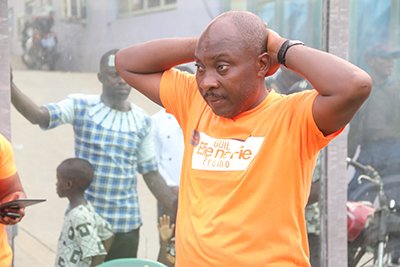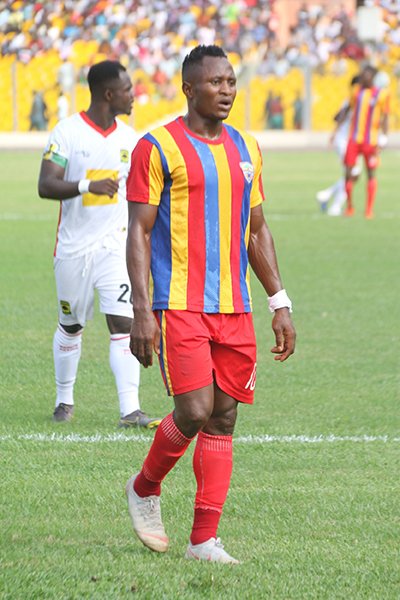Sports
Exit of Esso, 4 others for free … case of managerial lapse or player ingratitude?

The process in securing the signatures of players is one that club officials in charge of transfers always hope to overcome quickly.
It becomes even more cumbersome when more than one club has expressed interest in the player.
As if that is not enough, the posture of the player’s agent and the attitude of the player tend to blow the entire transaction out of proportion.
These and other factors likely contribute to the kind of celebration often witnessed among soccer fans on news that their respective teams have signed certain players.
That aura around such transfers is not only peculiar to the foreign or advanced leagues. It is a phenomenon that cuts across every league competition around the globe.
In Ghana’s football scene, two major events have occurred this week; putting fans on edge as they await a return of football action after the COVID-19 enforced break.
The first was the appointment of Nana Yaw Amponsah, a Ghana Football Association (GFA) presidential aspirant in the last election won by Kurt Okraku and being contested at the Court of Arbitration for Sports (CAS) on the corridors of FIFA as Chief Executive Officer (CEO) of Kumasi Asante Kotoko.
It has come as great news for members of the Porcupine Warriors family as the new CEO has already promised ‘heaven on earth’ for the Reds ahead of the first kick under his tenure.
But reviews over that appointment appears to have overshadowed a ‘Coup d’état’ in Kotoko’s fiercest rivals, Hearts of Oak that has seen five key players of the club exit the team on the free.
Top striker Joseph Esso, Christopher Bonney, Bernard Arthur, Benjamin Agyare and Abubakar Traore were all announced to be departing the club after the expiration of their existing contracts.
In fact, the news came as a shock to many who wondered why a club of Hearts stature would allow top first team players to run down their contracts and leave for free at the end of the season.
Considering the abrupt ending of the season one could pardon the Phobians for what many see as a disaster but as usual, a few have questioned the competence of officials in charge of player transfers and negotiations.
Hearts have found themselves in similar waters in the not too distant past where players like Thomas Abbey, Vincent Atinga, Kwame Kizito and Patrick Razak left the club under similar circumstances.
This will surely give credence to the school of thought of the section of the fans that believes there is something wrong with the club’s negotiation power and managerial skills.
Truth be told, this does not happen often. Even if it does happen, it must not be on such scale but indeed, one also understands how it works when a player takes a decision against an extension; it will take more than negotiation and managerial competence to change that stance – a case in point is the Charles Taylor saga with Hearts and Kotoko involved.
Hearts have since attempted to explain issues to the fans, citing the expectation or demands of the players, especially Joseph Esso, as the reason why those decisions were taken.
As a firm believer in loyalty and commitment, it will be suicidal to keep players whose commitment to a course is hinged on only the financial benefits.
In this industry, trophies remain the biggest currency for any club or player and in Ghana, Hearts and Kotoko represent the brightest platform for any player to win laurels; forget about the recent trend where they seem to have taken a nosedive in terms of performance.
The failure of the club to convince the five players to stay notwithstanding, it is limpidly clear that the players have the lost the desire to be in the rainbow colours and should be allowed to go.
But the case of Manchester City’s Leroy Sane in the English Premier League should offer Hearts and other clubs some lessons that it is not always advisable to let the players run the entire term.
Having failed to persuade the German international to stay, Manchester City sold him with a year left on his contract and got about £40m.
In the Hearts explanation, it was stated that negotiation was ongoing for a while so one could argue that the writing was on the wall; they saw the signs but paid little attention to it.
A legend of the club, Yaw Amankwah Mireku has also attempted to defend the club, parrying the blame on the club’s management and rather sought to cite ingratitude on the part of the players and the treatment often meted out to players when they join clubs.
Of the two, the latter is very striking and is very common with local clubs and coming from a player that excelled on the local scene, it must be taken seriously.
It was unfortunate he didn’t give many details. It will therefore be difficult to explain exactly what he means but from the little experience gained by association to local clubs, it would be important to advise clubs to take such matters serious to reduce such incidence.
By Andrew Nortey
Sports
Medeama eye revenge against Karela United

Ghana Premier League leaders, Medeama SC, will welcome Karela United to the TnA Stadium in Tarkwa tomorrow, in a Matchday 20 game with the aim to stretch the lead.
Medeama SC, the 2022/23 champions, are aiming to win the title for the second time in their history and, rightly so, have opened a seven-point gap.
Coach Ibrahim Tanko and his charges have been at their marauding best both home and away, recording 40 points from 19 games.
They go into tomorrow’s game with high hopes of avenging the only defeat suffered this season, which came at the hands of Karela United.
For Karela, who are eighth on the table, a double over the leaders will help their push for a top-four finish this season.
Defending league champions and second-place team, Bibiani Gold Stars, will trek to the Berekum Golden City Park to play as guests of struggling Berekum Chelsea tomorrow, with sight set on closing the gap on the leaders.
The Baba Yara Sports Stadium will come alive as striker Albert Amoah leads his Asante Kotoko side to tackle Basake Holy Stars.
Asante Kotoko have lost three games this season including a painful 2-1 defeat to Holy Stars in the first-round tie.
In other games, the University of Ghana Stadium will today host the Eleven Wonders versus Accra Hearts of Oak match; the Swedru Stadium will host Swedru All Blacks FC and Aduana FC; the Nana Fosu Gyeabour Park in Bechem is venue for Bechem United and Heart of Lions; while the Hohoe Stadium play host to the Hohoe United and Vision FC clash; and the Nsenkyire Sports Arena hosting the Samartex FC versus Nations FC game.
BY RAYMOND ACKUMEY
Join our WhatsApp Channel now!
https://whatsapp.com/channel/0029VbBElzjInlqHhl1aTU27
Sports
A call referees must heed to

It’s less than a week since the 2025 AFCON ended in Morocco.
For those that had the privilege to watch it via television, it may have gone into the competition’s annals as one of the best in terms of organisation.
But for the ‘yen bo biom’ (match abandonment) ‘excellently’ staged by the eventual winners, Senegal’s Terranga Lions, AFCON 2025 was beautifully staged and was incident free.
But in the social media age, it is extremely difficult to get every incident wrapped under a cover of darkness.
Videos showed a mix-up at the goal area of Senegal arising from a towel placed near the goal post by goalkeeper Mendy.
But almost a week after, two countries – eventual winners Senegal and Ghana, a non-participant, are still celebrating the gains from the championship.
Streets of Senegal have been filled with fans who wants to catch a glimpse of their heroes.
The victory marked the second time Senegal have been crowned AFCON champions, having won the competition for the first time in 2022.
Characteristic with teams’ success in Africa, they have been handsomely rewarded.
Senegal president, Bassirou Diomaye Faye, has announced that each member of the AFCON winning squad will be awarded a plot of land on the country’s coastline.
Additionally, each player will receive 75 million CFA francs ($134,000; £100,000).
In Ghana, FIFA Referee and Video Assistant Referee (VAR), Daniel Laryea, has become a cult hero with his encouraging performance, especially in the semifinal game between neighbours Nigeria and Morocco.
Last week, this column amply celebrated him and ordinarily, one would expect the focus to shift; and rightly so, the focus is actually not on him but referees of the Ghana Premier League (GPL) whose action, if not sanctioned, could ruin the gains and image credibility Laryea won for Ghana.
A number of clubs have been complaining recently about the state of officiating in the GPL as others threaten to boycott if the situation does not improve.
Kotoko was among the complainants after a decent goal in their game against Gold Stars was disallowed for a very funny reason.
An incident was also reported from Tema where a referee changed a decision to disallow a goal after watching a video of how the goal was scored on a Smart Phone of a fan.
Those reports, the success story of Daniel Laryea and a call by the Vice President of the Ghana Football Association, Mr Mark Addo on referees to aim higher has occasioned this opinion piece, to perhaps remind referees of their responsibilities in making the game attractive in Ghana and the duty of the FA to crack the whip on erring referees.
The FA Vice President, in presenting FIFA badges to 23 Ghanaian referees including Laryea for the 2026 football season, saying that, “I urge you (referees) to keep your heads high. There is a lot of expectation on you, and you must work hard to maintain the standards required”.
He continued: “Aspire for greatness and aim to become world-class referees. How you are perceived when your name comes up matters. Impartiality, fairness and top-class performance must always guide your work.”
In the face of what is happening, Addo’s call was appropriate and straight to the point.
Referees are vital cogs in the football ecosystem and their doing and undoing could make or unmake the efforts put in by a club. What can be more frustrating than a club scoring a genuine goal to be disallowed wrongly?
Many years ago when Asante Kotoko felt cheated and no one listen to them, they staged ‘ye bo biom’ which should not have a place in football. Senegal has just added an international dimension to it.
This is why the FA must sit up and check the names of referees which are becoming synonymous with undesirable officiating against some particular clubs.
By Andrew Nortey







